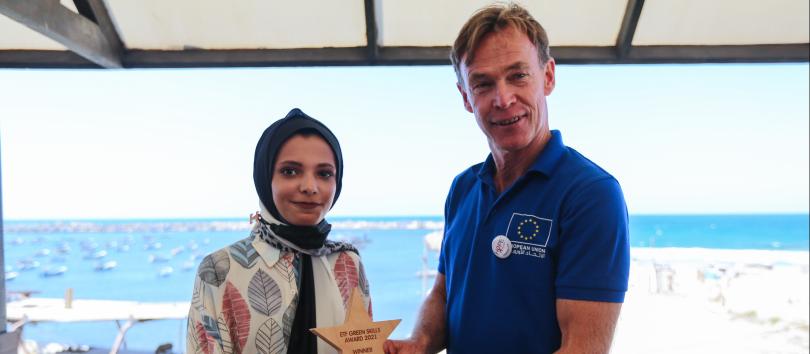
Palestine - Rediscovering the Green Skills Award winner
EU Representative to the West Bank and Gaza Strip, Sven Kühn von Burgsdorff, has awarded ETF's Green Skills Award winner Ghada Krayem in Gaza. "We encourage other young Palestinians to follow Ghada’s footsteps in exploring green solutions for a better and sustainable future", flagged the Office's social media accounts.
20-year-old Ghada Zaki Krayem, a young student at the Gaza Training Centre, was voted by thousands of citizens from all over the world as best practice in teaching and learning of green skills. Her story highlights the need to tackle both inequality and climate change at the same time through an innovative scheme to train young people as solar power technicians. This scheme emerged as the winner out of 11 finalists selected from 134 applications from 39 countries. Read more about her story.
***
A technical vocational training school working with Palestinian refugees in the Gaza Strip is aiming to tackle both poverty and climate change in one go with a new scheme to train young people as solar power installation technicians.
UNRWA (United Nations Relief and Works Agency for Palestinian Refugees) is running the project, at the Gaza Training Centre (GTC), with the backing of Germany's overseas aid organisation GIZ.
Designed to help reduce reliance on external sources of energy - over which the Gaza Strip has no control - and to help address the regular power cuts experience in the area, the project aim to harvest the natural power of the sun over Gaza to produce electricity for local use.
Its green credentials have made it one of the finalists in the European Training Foundation's GreenSkills Awards, of which she was awarded as winner on Friday, June 25.
Finalists have been selected from applicants asked to identify good practice in "Green transition: education, training and skills." The aim is "to collect stories about how education, training and skills development are supporting the shift towards sustainable, clean, carbon-neutral circular economies and societies," the ETF says.
Mohammed Al-Egha, Technical support projects coordinator, Education Programme, at UNRWA's Gaza Field Office says that the Installation and Maintenance of Solar Photovoltaic Systems, was provided training to "98 vulnerable Palestinian refugees, including 27 women."
In addition to the core trainees, the scheme provides TVET trainers with training to enhance their capacity to deliver the course and also provides elements of training in the field to a further 120 students on a range of technical courses, allowing topics related to photovoltaic installation to be incorporated in their courses.
Following the one-year training, the solar technician trainers were provided with paid apprenticeships in local companies in the field.
"This provided an opportunity for boosting the ability to employ the skills they learned, and for increasing livelihood opportunities and securing income within a context of overwhelming poverty and unemployed," Al-Egha notes.
Involving women in a traditionally male-dominated field was also a novelty of the project - so much so that UNRWA published a story on its website earlier this year focussing on one of the female trainees, Ghada Krayem:
When 20-year-old Ghada Zaki Krayem pulls into a new job site, jaws drop. Unperturbed, she marches up with her drill and toolbox and gets to work installing solar panels.
A GTC student, Ghada said that when she considered taking up the training, Gaza's 70 percent youth unemployment rate weighed heavily on her mind.
"When I thought about where I want to be in four years, I imagined myself as an entrepreneur. I needed an in-demand specialty and searched for a field of study that would stave off unemployment.”
Developing greater self-reliance in energy provision - and using sustainable, renewable sources of energy - is an urgent issue in the Gaza Strop, where more than 2 million people, 72 percent of them Palestinina refugees, live. For the past 14 years the territory has been under blockdate and fuel shortages are ubiquitous, causing rolling electricity cuts of up to 11 hours a day. But with plenty of Mediterranean sunshine, the UNRWA project aims to help boost a nascent green industry.
Ghada has already noted the potential of the industry, she told UNRWA.
"Before enrolling at GTC, I went to some factories and desalination plants powered by solar photovoltaic systems. I was fascinated, so I enrolled in the GTC programme ready to do whatever I needed to succeed!”
She is now one of the first women solar voltaic systems technicians in Gaza, and has won the respect of her male colleagues:
“At first, our colleagues who were men were astonished that there were women in the programme with them. They would question our ability to hold the drill and weld steel beams, but we paid no mind. The women supported each other until the camaraderie became infectious and our men colleagues evolved and began to support us as well."
UNRWA put the scheme forward for the ETF GreenSkills Awards confident that it ticked all the boxes, Al-Egha says.
"It increases environmental awareness, develops environmentally friendly technologies, creates new occupations and creates a demand for upskilling and reskilling."
It also contributes to the a key plank of the GreenSkills objectives by "requiring close interaction between education and its environment to build skills ecosystems where skills development goes hand in hand with economic, technical and social change."
The next challenge for the project to scale it up, although that will require more funding to reach a wider group of trainees and trainers, organisers say.
Did you like this article? If you would like to be notified when new content like this is published, subscribe to receive our email alerts.